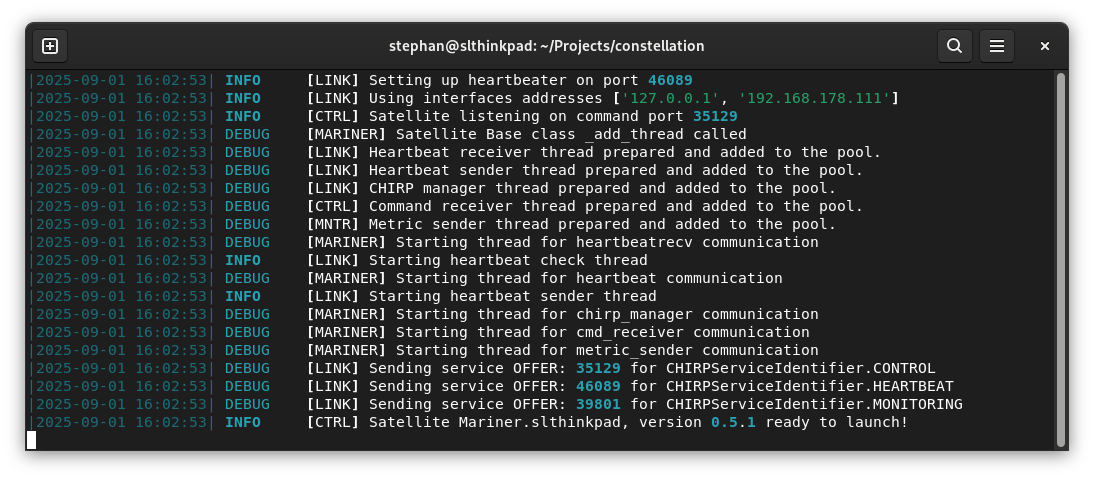Constellation Preview Release 0.6#
We are happy to announce the release of Constellation version 0.6, named Triangulum Australe.
Breaking Changes#
Programs using previous versions of Constellation might not compatible with this version due to the breaking changes to our data transmission protocol.
New Data Transmission Protocol#
In this release, we reworked our data transmission protocol (called CDTP) entirely. This rework was necessary due to performance issues in the maximum data rate in particular for small payload sizes. The new protocol improves the data rate about 10x for small payloads compared to previous version on identical setups.
Attention
As part of this rework, the data transmission API has changed both in the C++ and Python version of the framework:
Changes in the Python Interface#
The
DataSenderandDataReceiverclasses have been renamed toTransmitterSatelliteandReceiverSatelliterespectively. They can be imported as followed:from constellation.core.transmitter_satellite import TransmitterSatellite from constellation.core.receiver_satellite import ReceiverSatellite from constellation.core.transmitter_satellite import TransmitterSatelliteArgumentParser
The begin- and end-of-run user dictionaries are now in lower-case, i.e.
self.borandself.eorinstead ofself.BORandself.EOR.Previously, data could be sent by putting a tuple in a queue:
self.data_queue.put((payload, meta))
Now, a data record has to be created to which data blocks are be added before it is sent:
data_record = self.new_data_record(meta) data_record.add_block(payload) self.send_data_record(data_record)
Changes in the C++ Interface#
The interface in C++ has been changed in a similar manner. The new functions names are:
auto data_record = newDataRecord(1);
data_record.addTag("key", value);
data_record.addBlock(std::move(payload));
sendDataRecord(std::move(data_record));
Changed H5 File Format#
Due to changes in the transmission protocol, the file format in the H5DataWriter satellite was changed.
The new file formats for the normal and SWMR modes are described in detail in the
satellite documentation.
Interrupt and Failure Functions Changed in C++#
The function signature for the interrupting() and failure() Satellite methods in C++ changed. They now also take an
std::string_view as argument containing the reason for the interrupt or failure:
void interrupting(protocol::CSCP::State previous_state, std::string_view reason) override;
void failure(protocol::CSCP::State previous_state, std::string_view reason) override;
New Features#
Satellite Templates#
We made it simpler to create new satellites from scratch by providing template projects, which already have all the necessary files for a satellite as well as CI configurations for GitLab and GitHub. The documentation on how to get started creating a new satellite was also extended in the Application Developer Guide.
Docker Images#
Constellation is now available as Docker image, allowing to run satellites in a container. Details on how to use these new images can be found in the Operator Guide.
Improved Logging in Python#
Logging in Python looks significantly prettier thanks to the use of rich. As a bonus feature, logging of external Python logging is now also formatted nicely without any code change required.

New Await Function in the Python Controller#
The Python Controller now has a await_satellites function which takes a list of canonical satellites and waits until all
of those satellites are connected.
Previously, waiting for satellites in a script could be done like this:
while len(constellation.satellites) < n_satellites:
print("Waiting for satellites...")
time.sleep(0.5)
Now, this process can be made more reliable by directly specifying the satellites:
ctrl.await_satellites(["Sputnik.s1", "Sputnik.s2"])
Detailed Changelog#
The following changes related to protocols are included in this release:
MR!659: Switch to CDTP2 for significant performance improvements
MR!874: Move optional header tags to satellite implementation guidelines
The following changes related to satellites are included in this release:
MR!833: Metrics of the
Spuntiksatellite are now registered in the constructorMR!863: Write user-tags from BOR and EOR to file in
EudaqNativeWriter
The following improvements for the C++ version are included in this release:
MR!785: The
awaitState()method of the Controller now can take an additional argument to ensure that a satellite actually reconfiguredMR!807: Add mimalloc as possible memory allocator in addition to jemalloc
MR!825: Add reason to interrupt and failure methods
MR!841: Fix STAT macro not working with arbitrary types
MR!842: Print more information on executable when using
--versionMR!847: Allow not building any satellites
MR!888: More consistent quoting using a new
utils::quotefunction
The following improvements for the Python version are included in this release:
MR!845: Fix log level needing to be provided in upper case
MR!846: Rename of the Python CHIRP components to better reflect the use of multicast
MR!870: Add new
await_satellitesfunction to wait for specific satellitesMR!871: Fix
TypeError: unsupported operand type(s) for +=: 'NoneType' and 'str'MR!872: Improve logging and move to rich
MR!877: Implement marking runs as degraded
MR!890: Fix race conditions in Controller and network discovery
The following miscellaneous changes are included in this release:
MR!646: Satellites in the Constellation GitLab group are now displayed on the website
MR!800: Add more sequence diagrams for protocol
MR!826: Document and harmonize log topics
MR!861: Document satellite templates
MR!886: Disable warning when building with
build_gui=noneMR!887: Add GitHub actions with basic CI pipeline
MR!889: Add how-to for using satellites as systemd services
MR!901: Update CI matrix
MR!902: Use any address for receiving endpoint in CHIRP
Notes#
The software is publicly available under the EUPL-1.2 from the DESY GitLab repository. In addition, the Python version is available on PyPI and the C++ version is available on Flathub for Linux.
It should be noted that this is a preview release and some interfaces and protocols might change until the first official major release.
